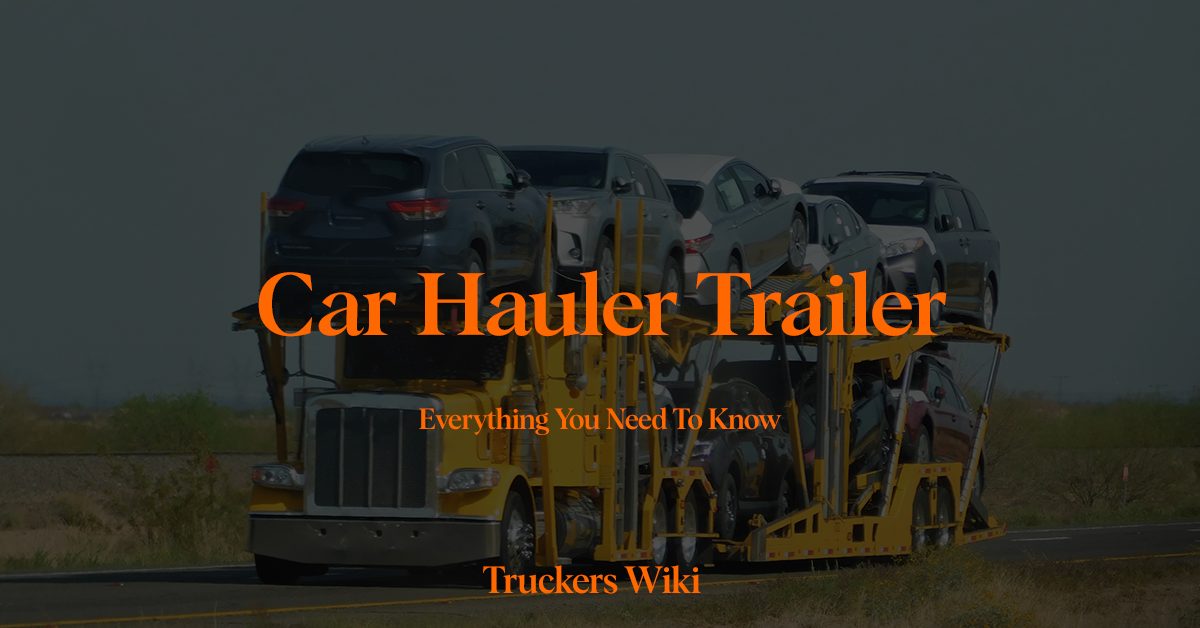
Table of Contents
What is a Car Hauler Trailer
Car Hauler trailer, also known as auto transport trailers, are specifically designed to transport vehicles safely and efficiently from one location to another. They play a crucial role in a range of industries including automotive, logistics, manufacturing, and even motorsports. Whether transporting cars from manufacturers to dealerships or moving used vehicles to auctions, car-hauling trailers are indispensable in the automotive world.
Design of Car Hauling Trailers
Car hauling trailers are available in various designs and configurations, but all are built to secure vehicles during transit and protect them from damage. A typical car hauling trailer features multiple levels of decks or ramps where vehicles can be parked and securely fastened.
Two main types of car hauling trailers are commonly used in the industry: open and enclosed.
Open Car Haulers
The most common type of car hauling trailer, open haulers are essentially flatbed trailers with multiple tiers. Vehicles are exposed to the elements but are secured with straps or chains to prevent movement during transit. These trailers are more affordable and lighter than their enclosed counterparts, and their open design allows for transport of a larger number of vehicles at once. They are typically used for new car deliveries and bulk transport.
Enclosed Car Haulers
Enclosed car haulers offer protection from weather and road debris, making them the choice for transporting high-value, vintage, or luxury cars. These trailers are usually single or double-deck and come with a higher price tag due to the added protection they provide. However, their enclosed nature limits the number and size of vehicles they can carry.
Operational Considerations
Operating a car hauling trailer requires special skills and considerations. Loading and unloading vehicles onto the trailer is a careful process to prevent damage. Each vehicle must be securely fastened to the trailer using straps or chains and checked regularly during the journey.
Furthermore, car haulers need to be aware of height restrictions on their routes as car hauling trailers, especially those carrying vehicles on raised decks, can be quite high. Weight restrictions also apply, as the combined weight of the trailer and its cargo must not exceed legal limits.
Driving with a car hauling trailer also requires extra caution due to the increased length, width, and weight of the vehicle. Turns, backing up, and braking all require additional space and careful handling.
Licensing and Regulations for Car Hauling
Car hauling, like any commercial driving operation, comes with its own set of licensing requirements and regulations. These are designed to ensure the safety of the driver, the vehicles being transported, and other road users.
Commercial Driver’s License (CDL)
The first requirement for most car hauling operations is a Commercial Driver’s License (CDL).
A CDL is required in the United States to operate any type of vehicle that has a gross vehicle weight rating (GVWR) of 26,001 pounds or more. For hot shot non CDL car hauling check the part below.
To learn more about CDL click here.
CDL Endorsements
Certain types of car hauling may require specific endorsements on a CDL. An endorsement is a certification that a driver has extra knowledge or skills. For example, if a car hauler is operating a vehicle with air brakes, they must have an air brake endorsement.
FMCSA Regulations
Car haulers must also comply with all Federal Motor Carrier Safety Administration (FMCSA) regulations. These rules govern a wide range of factors including hours of service, inspection and maintenance of vehicles, and record keeping. For example, under FMCSA regulations, drivers are typically limited to 11 hours of driving after 10 consecutive hours off duty.
To learn more about FMCSA click here.
Hot Shot Car Hauling
Hot shot trucking is a specific type of car hauling that can be done without a CDL in a certain setup. This is because hot shot trucking often involves smaller loads and lighter vehicles that fall below the weight threshold for a CDL requirement (26,001 pounds GVWR). It’s common to see hot shot truckers transporting a smaller number of vehicles using a dually pickup and a gooseneck trailer. All in all with the right setup you can hot shot haul 3 cars.
Learn about Hot Shot Trucking here.
Insurance and Liability
Regardless of the type of car hauling operation, it’s crucial to have the right insurance coverage. This includes liability insurance for any damage or injuries caused during the operation of the vehicle, as well as cargo insurance to cover the vehicles being transported.
In summary, while there can be some exceptions like hot shot car hauling, most car hauling operations will require a CDL, along with compliance with all relevant FMCSA regulations. It’s always a good idea to check with state and local authorities to ensure you’re meeting all necessary requirements and regulations.
To learn more about insurance click here.
Learn more about Commercial Motor Vehicles (CMVs) here.
The Bottom Line
Car hauling trailer is a major tool in the automotive and transportation industries, enabling the efficient and safe transport of vehicles over long distances. While they require specific skills and knowledge to operate, they provide an invaluable service, ensuring that vehicles reach their destination in perfect condition, ready for the next phase of their journey.
To learn more about the types of trailers used in the trucking industry click here.

